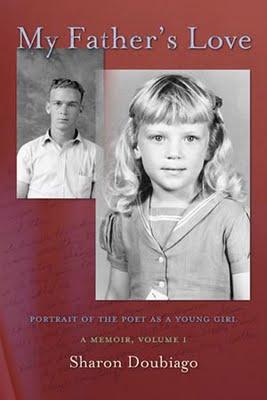My Father’s Love: Portrait of the Poet as a Young Girl

I find memoirs difficult to criticize, especially when the content is personal and intimate. The first volume of author and poet Sharon Doubiago’s memoir, My Father's Love, feels like an open wound, the scar tissue scraped off to allow for belated healing. My Father's Love is a detailed account of Doubiago’s childhood, tragically defined by sexual molestation by her father, and willful ignorance by her mother.
This is an engaging book, thanks to Doubiago’s poetic and honest language, fastidious fact checking, and pages of photographs to give a visual to the people in her early life. She traces her family tree back to its American roots, finding common threads that run throughout her family genealogy and her own life. This is not a short book, running over 400 pages, and yet Doubiago makes it all a coherent account. I turned each page, not to find out what happens next, but to get to know the young Sharon from the photographs.
Engaging with this story became confusing for me. Why do I read this book? Is it for myself, or for Doubiago? It’s not for entertainment or education, and there’s a bit of guilt involved in what sometimes feels like an invasion of privacy. Memoirs as a genre walk a fine line between voyeurism and empathy, exhibitionism and honesty.
Memoirs can be notoriously bad, exemplifying “navel-gazing” and self-promotion. However, a good memoir can be sublime. My personal favorites are Maxine Hong Kingston’s The Woman Warrior, Sylvia Plath’s The Bell Jar (admittedly a fictionalized memoir), and Allison Bechdel’s Fun Home. These are books that restore my faith in the memoir, so often challenged by poorly written, self-congratulatory schlock (I don’t need to name a recent “rogue” publication). My Father's Love, a heart wrenching read with a grim ending, evokes disconcerting emotions and questions, and demonstrates what a memoir is capable of.
Doubiago brings up weighty issues such as patriarchy, class discrimination, and false memory, as well as the pervasive problem of familial sexual abuse. The issue of false memory plagued me while reading her account, as she describes the resistance to her claims from her family, and even in her own mind. I too wanted her memories to be false, for her young handsome father to have never betrayed his daughter, despite the truth. One of Doubiago’s greatest accomplishments with this book is showing how complex memories can be, as she exposes her own process of remembering.
After finishing My Father's Love, I started thinking about the role of memoirs. Why is it important as women to tell our stories? And why, as women, is it important that we read each others' stories? Perhaps it is a cycle, and through telling and listening, reading and writing, a memoir becomes complete.
I read a lot of memoirs, all by women and while yes, some were disappointing (hard to write well if you're not a writer), I could probably write an essay why women memoirs are important and what they do for us, the readers and the author.
Going to let this stew a bit. I will be writing about this. Thanks for the inspiration.